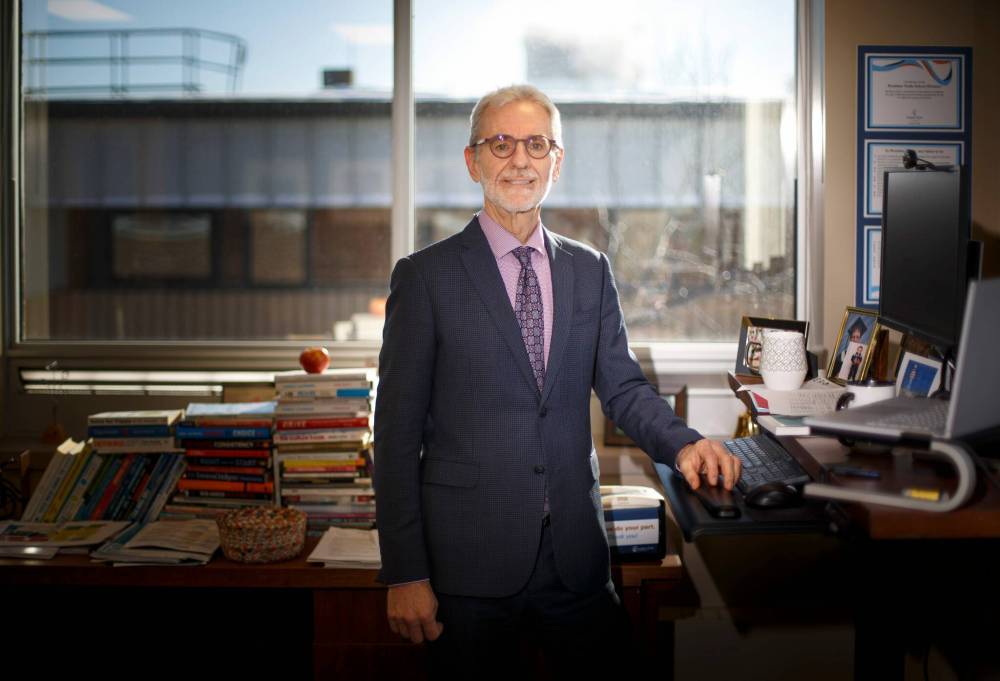Pembina Trails superintendent to retire
Advertisement
Read this article for free:
or
Already have an account? Log in here »
To continue reading, please subscribe:
Monthly Digital Subscription
$0 for the first 4 weeks*
- Enjoy unlimited reading on winnipegfreepress.com
- Read the E-Edition, our digital replica newspaper
- Access News Break, our award-winning app
- Play interactive puzzles
*No charge for 4 weeks then price increases to the regular rate of $19.00 plus GST every four weeks. Offer available to new and qualified returning subscribers only. Cancel any time.
Monthly Digital Subscription
$4.75/week*
- Enjoy unlimited reading on winnipegfreepress.com
- Read the E-Edition, our digital replica newspaper
- Access News Break, our award-winning app
- Play interactive puzzles
*Billed as $19 plus GST every four weeks. Cancel any time.
To continue reading, please subscribe:
Add Free Press access to your Brandon Sun subscription for only an additional
$1 for the first 4 weeks*
*Your next subscription payment will increase by $1.00 and you will be charged $16.99 plus GST for four weeks. After four weeks, your payment will increase to $23.99 plus GST every four weeks.
Read unlimited articles for free today:
or
Already have an account? Log in here »
Hey there, time traveller!
This article was published 25/01/2022 (1417 days ago), so information in it may no longer be current.
A metro school board is searching for a new superintendent, after longtime leader Ted Fransen submitted his retirement letter to trustees in the Pembina Trails School Division this month.
In a notice dated Jan. 13, Fransen began with: “It is time!”
“It’s been 40 years. I have had a wonderful 40-year career in education and I am healthy and I have six grandchildren, and three of them live in Ontario, so it’s simply time to devote the next chapter of my life to things outside of the realm of being a superintendent,” the 63-year-old said in a recent interview.

Fransen will continue overseeing the Winnipeg district, which has a student population of almost 15,000 and nearly 2,000 employees, until the 2022-23 school year gets underway in September. He said he will support his successor’s transition so a new face can lead the community during the latter half of the COVID-19 pandemic.
By the time Fransen retires, he will have served as Pembina Trails chief executive officer for nearly nine years. He was an assistant superintendent before that, dating to 2005.
When Fransen’s young family moved to Winnipeg from southwestern Ontario — where he studied education — so he could take on a science teaching job at Mennonite Brethren Collegiate Institute in the 1980s, he had no intention of braving Prairie winters for the rest of his life.
Much to his surprise, Fransen found a passion in teaching American history at MBCI and stuck around. He rose in the educational ranks to become a vice-principal, principal and division leader.
Fransen, who acknowledged he could not have built his career without the support from his wife, a now-retired public health nurse, has worked in various roles in Winnipeg, Altona and Morden.
According to the province’s latest public-sector compensation disclosure report, he currently earns $204,049 annually.
School board chairwoman Kathleen McMillan said she has no doubt there are many qualified candidates, but Fransen’s visionary leadership and wisdom will be greatly missed.
“He runs a respectful ship and he’s a very good listener,” said McMillan.
(Fransen’s self-described leadership style is “collaborative,” which he said he encourages by inviting criticism. Asked about the division’s media policy, which prevents educators from speaking to the Free Press, citing fears about workplace retribution, he indicated the policy is not unique in deeming only the superintendent and board chairwoman as division spokespeople.)
In recent years, the division introduced its “Accomplish Anything” slogan, started focusing on data-informed decision making to improve literacy education, and launched the Pembina Trails Early College, McMillan said.
She added the division facilitated a massive art installation highlighting the human rights of children at IG Field stadium in 2015, and was among the first to sign the Winnipeg’s Indigenous Accord in 2017.
Fransen also oversaw the mid-pandemic expansion of InformNet, Manitoba’s online high school, which is operated by Pembina Trails and St. James-Assiniboia.
“Learning is a social enterprise. We need each other to do that. The best way is in a classroom or in a group,” Fransen said.
At the same time, his prediction is InformNet will continue to thrive after the pandemic settles down as an ongoing complement to in-person learning: “What InformNet provides is that flexibility and one of the things that COVID has taught us is the importance of being flexible.”
Meantime, as the vaccine rollout continues for young learners, Fransen said he is concerned about uptake; roughly half of children ages five to 11 have received their first dose to date.
“If the public could truly see the impact in a K-4 or K-6 school, when so many kids are ill and so many of the parents are ill, I think we would actually have a higher vaccination rate,” he said, adding some school communities in the south end of the city have been hit extremely hard by the virus.
“It has been really a hardship for those families, the kids, their parents, their guardians, and the staff who serve them.”
maggie.macintosh@freepress.mb.ca
Twitter: @macintoshmaggie

Maggie Macintosh reports on education for the Winnipeg Free Press. Funding for the Free Press education reporter comes from the Government of Canada through the Local Journalism Initiative.
Our newsroom depends on a growing audience of readers to power our journalism. If you are not a paid reader, please consider becoming a subscriber.
Our newsroom depends on its audience of readers to power our journalism. Thank you for your support.



